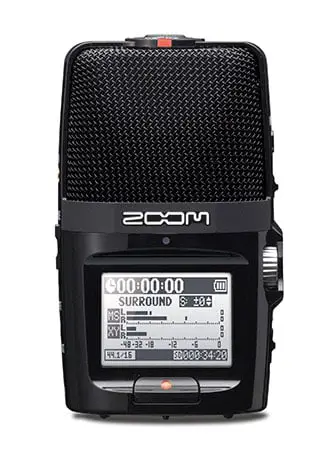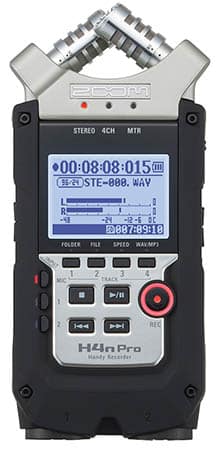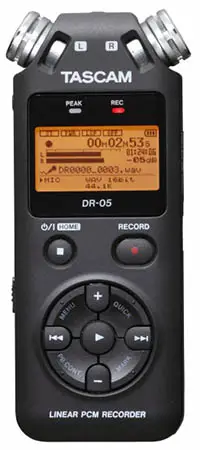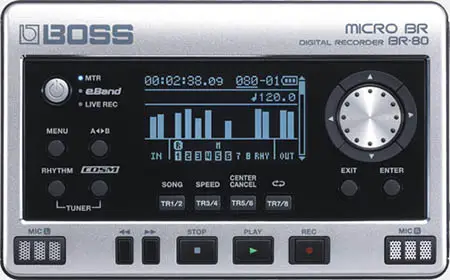The increases in technology over recent years have meant there are so many options for recording. Whether you wish to record onto your phone or another mobile device, onto a laptop or even onto a specifically designed product for recording on-the-go.
A portable guitar recorder can be the answer for you if you want a pocket-sized device you can simply grab and get a decent recording whenever you like. In this article, we’re reviewing and exploring some of the best portable guitar recorders to give you an idea of which features are most important, and which recorder is right for you.
What is a Portable Guitar Recorder?
You may recognize these styles of devices as ‘dictaphones’. They are often used for recording voices. Their portable nature means you can simply grab the device and start recording, and quickly get some high-quality audio of a conversation or lecture. This makes portable recorders very popular among students who want to record classes and lectures or for people conducting interviews, such as journalists.
As time has gone on, though, the audio quality that many of these recorders are able to produce has become more and more clear and can realistically be used for more professional applications.
As with many music tech products, there are so many choices on the market. The cheaper ones may have limited features, but the best-reviewed recorders have great features including long battery life, huge capacity to make recordings and a good quality microphone.
What Can a Portable Recorder Do for Guitarists?
It is important to work out your expectation before buying a portable guitar recorder. Though these products are incredibly useful for all sorts of musicians, it is key to understand that you probably won’t record a lot of audio that is suitable for making your number one album!
Portable guitar recorders are designed either to have inbuilt microphones, which are often pretty good in terms of their quality, or they are designed to allow you to connect your own microphone to them.
Portable guitar recorders don’t give as many options when it comes to recording a guitar as a setup involving an audio interface or a mixing desk. You often can only record via one microphone, so won’t be able to record at the same time as singing or while others play instruments if you want clean audio to use. They are also a little limited in terms of how you can position them. Most people who have done some recording will know that mic position is vital to the style and quality of the audio you will end up with. Portable guitar recorders don’t tend to have stands or a way to point the microphone, so you don’t have quite as many choices.
With these limitations in mind, it is important to know that portable guitar recorders can still be hugely beneficial products to have for guitarists. The quality modern products have means that there is no reason the audio can’t be used if you manage to get a clean recording of your guitar with no background noise. Even if the audio doesn’t make it to a final recording, portable recorders are such a good way to quickly record a demo of your guitar and singing, which you can neaten up in further recordings. If you’ve ever had an idea for a riff or chord progression and then forgotten it when you go to do something else, you’ll know how frustrating it is! You can record your audio and then you will have a helpful reminder if you do forget.
Another great benefit of having these recordings is the fact that you can send your recordings to others for feedback, and for them to add their own ideas. If you are in a band and don’t spend all of your time with bandmates, this is such a good way to show them what you have been creating.
Features to Look Out For
So, what makes a good quality portable guitar recorder? What should guitarists be looking out for that students and interviewers buying portable recorders won’t need to worry as much about? We have listed the most important features to be on the lookout for and evaluate before making your purchase.
Storage
Most of the portable guitar recorders have a fairly hefty amount of storage. Some only offer inbuilt storage whereas others are expandable as you can use SD and Micro-SD cards to record onto. How much storage you will need depends on the type of guitarist you are and how ‘off-grid’ you are going. If you’re back at a computer every evening and can upload your ideas you may not need that much, but if you’re recording on a tour bus for a few weeks, the more storage the better.
High-quality audio recordings can take up a lot of space. You will want a file which is lossless when you are recording, especially if you hope to use the recording in a commercial song or get the quality as clear as possible. Like video files, these can take up a lot of space and quickly eat up the flash memory you have available.
Battery Life
The idea of a portable guitar recorder is that it can be used anywhere, whether you’re near to a power supply or not. This means that battery life is one of the most important features. The likelihood is that you will be frustrated if you keep needing to charge the recorder after every 30 minutes of use! This means that one of the best options is to get a product which can last many hours of recording before it needs to be connected to the power supply, and one which charges quickly. In our individual reviews, we’ve looked at the battery life of these products. Some do have batteries which are less-than-perfect, which might not be an issue if you plan to regularly charge, but if you’re recording on long trips or out by a campfire with no power, it can be infuriating.
Ease of Use
It shouldn’t feel like you are operating complicated machinery! We’ve looked out for portable guitar recorders which have an easy interface and can be used by beginners. You shouldn’t need to have a degree in music tech to be able to quickly grab some recordings on a portable recorder.
Microphone
The microphone is the most important aspect of a portable guitar recorder, especially if you are looking for one for guitar. You won’t be happy with low-quality recordings, and it should provide a significant upgrade over recording on your phone, for instance.
The microphone which is inbuilt is vital, as this will be the easiest way to make recordings. However, there are models of portable guitar recorder which allow you to plug in your own mics and connect these via XLR cables, providing the option to record via some very good quality microphones, and mics you may already own.
The microphones inbuilt often have different features depending on which model you buy. Some brands try to create new and exciting ways that their mics can function and make recordings. For instance, some models of portable guitar recorder have selectable polar patterns. This means you can choose the areas (front, side etc.) that the mic is best suited to pick up sound from. Microphones may also have the options to EQ and “roll off” low frequencies to only pick up the sound frequencies which are useful to create a guitar sound.
Best Portable Guitar Recorders
The models below are those we’ve picked out as being the best (and easiest) for guitarists to record themselves.
Zoom H2n Handy Recorder
Many portable guitar recorders are made with peoples voices in mind, but this is a model which has been made for guitar players, too. The Zoom H2n (click here to check price on Amazon) is compact, but still has a lot of features which can make it your recording companion in a number of different scenarios.
This recorder actually has five microphones within, and this means that there are four modes you can choose from for recording, depending on which will best suit the room you are in and the recording results you are looking for.
This recorder is designed to be used with SD and SDHC cards, and can support flash storage up to 32GB, giving plenty of space to record onto. The quality is 24-bit wav by default, but you can record onto compressed MP3s to save space if needed.
The Zoom H2n also has some inbuilt effects such as a compressor and low cut filter, it also has a metronome, which can be very handy to ensure you’re recording in time.
The model needs a NiMH rechargeable model of battery, but can also work using AA alkaline batteries meaning you should never run out of juice. It can last 20 hours per set of batteries, too.
This is definitely a portable recorder made with guitar players in mind and the onboard effects and selectable recording patterns provide a lot of options.
Zoom H4N PRO Digital Multitrack Recorder
Zoom’s second offering to make our list of the top recorders for guitar. The H4N (click here to check price on Amazon) is more expensive than the H2n, but it has multitrack options so that you can record other instruments simultaneously, or record from a vocal mic as well as have one set up on your guitar.
The H4N has a built-in X/Y stereo mic, and just like it’s sibling product the H2n it is able to record up to 24-bit audio. The two inputs are the biggest difference to many of the other multitrack recorders, these allow you to connect external microphones.
The noise floor on this recorder is possibly the most impressive thing, and something that gets mentioned over and over again in reviews. The H4N picks up virtually no noise whether you’re recording voices or instruments, and the audio is very clean. Combine this with the fact that you can use your own mics and suddenly you have a product which can create professional audio recordings on the go.
The battery life of the H4N is lower, and you should only expect to get 6-8 hours per charge. Like the other Zoom models, you can use standard AA batteries, too, which means even if you need to change batteries it shouldn’t be too much of a big deal.
If you just need to make some recordings on your own then the H4N might be overkill. However, if you want to record vocals or other instruments at the same time, this portable recorder can do the job.
If you need more inputs, there is an alternative, too! You can record onto the H6N, also made by Zoom. This is very similar to the H4N but has two extra inputs. You can even make rough band recordings via this product.
Tascam DR-05 Portable Handheld Digital Guitar Audio Recorder – Best Budget Option
A lot of musicians out there are on a tight budget, and not looking to spend huge amounts on equipment. If you need a portable guitar recorder under or around $100 then the Tascam DR-05 (click here to confirm current pricing on Amazon) could be an option for you.
It has a built-in omnidirectional microphone. This is fine if your recording is the only noise going on, but it won’t do the best job of blocking out background noise, so be careful to record somewhere which is very quiet.
You can connect other microphones to the Tascam. There is a 3.5mm connector. However, mics made for 3.5mm connections tend not to be the music industry standard and are more likely designed with video and photography in mind.
Like many of the other recorders, this has a memory which is expandable via SD cards and is powered via AA batteries. This means that you won’t have to run out of battery and not have any way to recharge as you can always grab more batteries.
The audio quality is 24 bit and you can record in high-quality wav format or slightly lower quality MP3 format, depending on what you plan to use the audio for. Though this isn’t necessarily designed primarily for musicians, it does have an inbuilt chromatic tuner.
If you’re on a tight budget and you’re looking for a good product for creating some rough recordings which you will take to a studio later, the Tascam could be perfect.
BOSS Micro BR BR-80 Digital Recorder
The BOSS Micro BR BR-80 Digital Recorder (click here to check price at Amazon) is a brilliant multi-track recorder to make recording guitar a whole lot easier. It takes the audio from the ¼ inch jack that will usually connect your guitar from the amp and allows you to record directly into the BR-80. Obviously, for this, you require a guitar with an audio jack out, which means either an electric guitar or an electro-acoustic guitar. However, if you plan to use it with a fully acoustic guitar it does have a condenser mic built-in.
It can function as an audio interface when plugged into a computer, too. It has inbuilt effects, and also allows you to monitor your recording in real-time by using the headphone out. It has built-in backing tracks and rhythm patterns to play along with when you are recording and expandable flash memory.
Conclusion
There are many different options out there. The four guitar recorders we’ve chosen all have some very different features. The Tascam may be best for rough solo recordings, whereas the Zoom H4N or H6N might be better for those who want to expand with external microphones. Alternatively, electric guitarists may be able to use the Line 6 BackTrack. Choosing the best option for you will mean evaluating which features you need most and which recorder fits the bill.
When it comes to recording, the tools are helpful, but it is important you learn more about how to actually record guitar, how to choose a room with good acoustics, and brush up on your playing if you want the best results!




